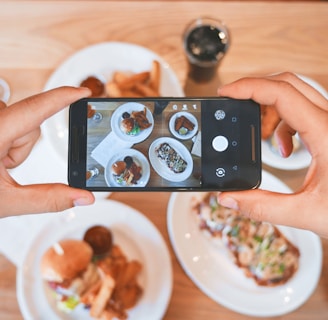NOW ACCEPTING NEW CLIENTS: In-Person in Calgary & Online across Alberta Book a Free 20min Introductory Call! CLIENT LOGIN
Social Media and Mental Health: It's Impact on Perfectionism and Relationships
This blog post, written by a Registered Psychologist, focuses on the impact social media use has on mental health, our relationships, and its link to perfectionism. It ends with tips for how to have a healthy relationship with social media.
PERFECTIONISMCOPING SKILLS
Kaylee Procter
4/9/20245 min read


Social media has become an integral part of our lives, allowing us to connect with friends, share our experiences, and stay updated on the latest trends. It's brought a lot of positive.
However, with social media also comes comparing ourselves against others, the highlight reel, loads of misinformation etc. Considering these negatives, you've probably thought at some point in time, is social media bad for our mental health? The truth is, it's not great.
Social Media and Mental Health
Social media allows us to see the highlight reels of our peers, celebrities, or strangers from around the world. With this insider information, comes pressure to have a life that lives up to what we see of others'. We see influencers have the "happy" relationship, big homes, and nice things. They have a wealth of friends and seem to "have it all together." When using social media, we begin to believe that other's expect us to achieve a certain standard of living, appearance, or social life. We then risk crumbling under this pressure and it can have a significant impact on our mental health.
According to research, social media use has been linked to the following:
A long-term negative impact on well-being (Curran, 2023).
Decreased self-esteem and mood (Curran, 2023).
Relationship issues, as social media cannot meet our attachment needs like face-to-face interactions can (Flynn, Noone & Sarma, 2018).
Those who use social media in excess were two to three times more likely to have depressive symptoms than those who did not use it at all (Curran, 2023).
Body image concerns and increased anxiety and depression in young people (Wells, Horwitz, & Seetharaman, 2021).
Social Media and Perfectionism
One of the key factors contributing to the negative impact of social media on mental health is the link to perfectionism. Platforms such as Instagram and Facebook are filled with carefully curated posts that often portray an idealized version of people's lives. This constant exposure to seemingly perfect lives can lead to feelings of inadequacy and low self-esteem.
Many individuals find themselves comparing their own lives to the highlight reels of others, which can create a sense of dissatisfaction and a never-ending pursuit of perfection.
This perceived pressure that we feel from others and societal expectations is called socially prescribed perfectionism and it can greatly impact our mental health (Curran, 2023). When we are constantly inundated with messages, videos, photos, and stories that showcase perfection, it is only natural that we will respond with self-criticism and feel that we are not enough. We feel this way because life isn't perfect and it's impossible to live up to the highlight reels.
Social media exacerbates perfectionism and maintains it.
Social Media and Our Relationships
Social media can be a more comfortable way to interact with others. It allows for a barrier between us and others, which may lessen the risk associated with being vulnerable. For this reason, social media can be used as a defensive strategy to avoid being close and intimate with others (Flynn et al., 2018).
The internet becomes a space where we can avoid painful emotions and put up a mask with others to protect ourselves from them fully seeing us for who we are.
When we rely on social media to meet our need for connection with others, this can result in interpersonal issues as we're putting up barriers to avoid closeness. It can take away from the truly meaningful connection of face-to-face interaction with others, where we can practice being vulnerable.
Social media prevents true closeness and intimacy with others.
Setting Limits on Social Media Usage
While social media can have a negative impact on mental health, it doesn't mean that we have to completely disconnect from it. Instead, it's important to set healthy limits on our usage to maintain a balanced relationship with these platforms.
1. Identify Your Triggers
Start by identifying the aspects of social media that trigger difficult emotions or feelings of comparison. Is it the constant stream of perfectly posed photos? The pressure to keep up with the latest trends? Understanding your triggers can help you develop strategies to minimize their impact on your mental well-being.
Once you've identfiied your triggers, consider unfollowing accounts that are provoking difficult emotions or feelings of comparison. Fill your feed with accounts that you find uplifting instead.
2. Set Boundaries
Establishing clear boundaries around your social media usage is crucial. Determine specific times of the day when you will allow yourself to engage with these platforms and stick to those boundaries. For example, you might decide to only check your accounts during designated breaks or after completing important tasks.
Additionally, consider setting limits on the amount of time you spend on social media each day. There are various apps and features available that can help you track and manage your screen time, allowing you to stay accountable to your goals.
Research has shown that reducing social media usage by as little as one hour per day results in an improvement in depression and anxiety symptoms (Brailovskaia, Delveaux, John, wicker, Noveski, Kim..., Margraf, 2022). It also increases feelings of happiness and health.
3. Cultivate Real-Life Connections
While social media provides a means of connection, it's important to prioritize real-life relationships. Make an effort to spend quality time with friends and family, engage in activities that bring you joy, and foster meaningful connections offline. This can help counteract the negative effects of excessive social media use and provide a sense of fulfillment and belonging.
Practice being vulnerable with others, as vulnerability brings true connection. For more information on this topic, check out Brene Brown's TED Talk here.
4. Practice Mindfulness
Mindfulness is a powerful tool that can help you navigate the digital world with greater awareness and intention. Take moments throughout the day to check in with yourself and assess how social media is impacting your mood and overall well-being. Consider implementing mindfulness practices such as deep breathing or meditation to help you stay grounded and present.
Click here for more information on mindfulness.
5. Focus on Authenticity
Instead of getting caught up in the comparison trap, remind yourself that social media is often a highlight reel. People tend to share their best moments and achievements, but this does not reflect the entirety of their lives. Embrace your own unique journey and celebrate your accomplishments, no matter how small they may seem in comparison.
Conclusion
Social media can have a significant impact on our mental health and relationships, especially when it becomes a breeding ground for comparison and perfectionism. By setting limits on our usage, identifying triggers, and prioritizing real-life connections, we can maintain a healthier relationship with these platforms. Remember, it's essential to focus on authenticity and self-compassion and celebrate our own journey rather than getting caught up in the illusion of perfection portrayed on social media.
If you're noticing yourself engaging in perfectionistic thinking, overindulging in social media, or feeling like you are not enough, reach out to our Calgary Psychologist at Tri Lotus Psychotherapy. We provide a complimentary phone consultation to see how psychotherapy can help or you can book your first appointment.
References
Brailovskaia, J., Delveaux, J., John, J., Wicker, V., Noveski, A., Kim, S., Schillack, H., & Margraf, J. (2023). Finding the “sweet spot” of smartphone use: Reduction or abstinence to increase well-being and healthy lifestyle?! An experimental intervention study. Journal of Experimental Psychology: Applied, 29(1), 149–161. https://doi.org/10.1037/xap0000430
Curran, T. (2023). The Perfection Trap: Embracing the Power of Good Enough. Simon and Schuster.
Flynn, S., Noone, C., & Sarma, K. M. (2018). An exploration of the link between adult attachment and problematic Facebook use. BMC Psychology, 6, Article 34. https://doi.org/10.1186/s40359-018-0245-0
Wells, G., Horwitz, J. Seetharaman, D. (2021). Ibid.
Let's Connect
Please fill out the form to request an initial appointment
or complimentary introductory call
Contact
hello@trilotustherapy.com
Clinic Hours
Monday: 5:00pm to 8:00pm
Tuesday: 1:00pm to 8:00pm
Wednesday: 8:00am to 8:00pm
Thursday: 8:00am to 8:00pm
Friday: 11:30am to 4:30pm
Saturday: 9:00am to 3:00pm
Copyright © 2025 by Tri Lotus Psychotherapy - All Rights Reserved


Land Acknowledgment: I gratefully acknowledge and honour that where I live, work and play is within the traditional territories of the people of the Treaty 7 region in Southern Alberta, which includes the Blackfoot Confederacy (comprising the Siksika, Piikani, and Kainai First Nations) as well as the Tsuut’ina First Nation, and the Stoney Nakoda (including the Chiniki, Bearspaw, and Wesley First Nations); and Métis Nation of Alberta, Region 3. The traditional Blackfoot name of this place is “Mohkinstsis”, which is also known now as Calgary.

